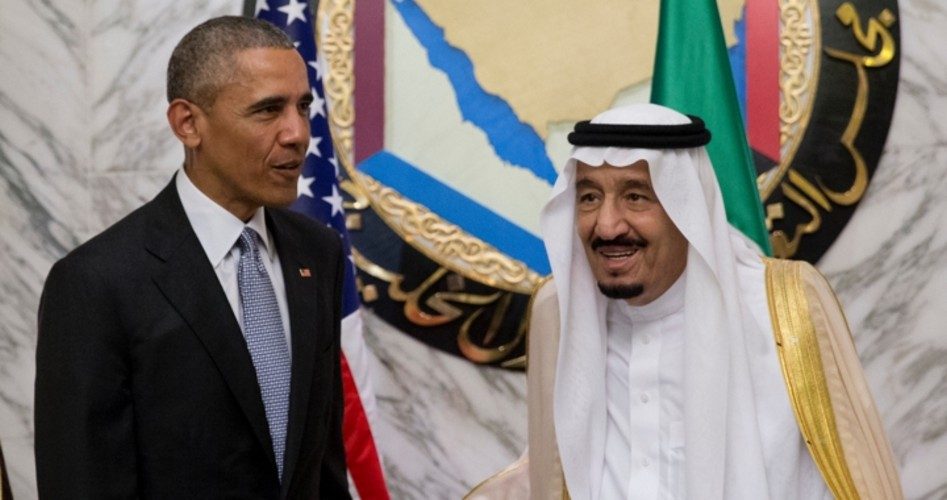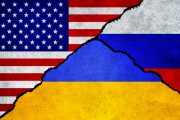
President Obama met with King Salman of Saudi Arabia in Riyadh, the kingdom’s capital, on April 20, as the president visited to attend a summit of Gulf Cooperation Council (GCC) leaders. The GCC is a regional intergovernmental political and economic union made up of all Arab states of the Persian Gulf, except for Iraq.
A White House communiqué issued on April 21 stated the goal of the meeting was “to reaffirm the GCC-U.S. strategic partnership in pursuit of a stable, secure, and prosperous region.”
Voice of America (VOA) — the official external broadcast institution of the U.S. government — noted several disputes between the two countries in its April 22 report about the meeting. Among these are Saudi government concerns about the U.S. nuclear deal with Iran and the Obama administration’s policy toward the Syrian civil war.
It also touched on a matter that has created a political firestorm back home — suspicions that some high Saudi officials supported the 9/11 terrorist attacks, stating: “Another issue is the possible release of U.S. documents that might point some blame at Saudi officials for the September 11, 2001 terrorist attacks. Saudi officials strongly deny this.”
In his statement made during the joint press conference with King Salman at Diriyah Palace in Riyadh, Obama reviewed what he described as “the important progress” the two nations have made in building a stronger partnership “to deter and confront external aggression against our allies and our partners.” The president specifically mentioned:
• “We remain united in our fight to destroy ISIL, or Daesh, which is a threat to all of us.”
• “We’ll continue to offer support to Iraq as it liberates and stabilizes towns and cities from ISIL control, and we’ll remain leading donors of humanitarian aid to the peoples of Syria and Iraq.”
• “We agreed to continue working closely to de-escalate and resolve regional conflicts.” Obama referred mainly to Syria, where he said the goal of the United States and it GCC partners was “a transitional governing body, a new constitution with free elections, including a transition away from Assad.”
The subjects of possible Saudi involvement in 9/11, pending legislation in the U.S. Congress to give families of 9/11 victims the right to sue Saudi Arabia for compensation for the loss of their loved ones, or the threat made by Saudi Foreign Minister Adel al-Jubeir to sell hundreds of billions of dollars of American assets if Congress passes such legislation, were not addressed in the U.S.-Saudi statements.
An article in Britain’s Daily Mail for April 20 expressed open criticism of the Obama-Salman meeting in light of the many unanswered questions concerning possible Saudi involvement in 9/11 and asked in the headline: “How can Obama break bread with them?”
The Daily Mail article cited a report in Britain’s April 20 Times stating that new evidence has surfaced about a possible link between Saudi Arabian officials and the 9/11 terrorist attacks. The Times report stated that one Ghassan al-Sharbi, a Saudi who became an al-Qaeda bomb maker, “is believed to have taken flying lessons with some of the 9/11 hijackers in Arizona but did not take part in the attacks on New York and the Pentagon that killed 3,000 people in 2001.”
The report noted that al-Sharbi was captured in Pakistan in 2002 and has since been held at Guantanamo Bay. It referred to a U.S. intelligence memo, written in 2003 but just declassified last year, stating that the FBI had learned that al-Sharbi had buried a cache of papers shortly before he was captured. Among the uncovered papers, said the report, was al-Sharbi’s U.S. flight certificate in an envelope from the Saudi embassy in Washington, D.C.
Russia’s RT news provided more details about this incident in its April 21 report. RT said that the intelligence memo revealing the details about al-Sharbi was compiled for the FBI by two U.S. investigators, Dana Lesemann and Michael Jacobson, who were searching for the possible roles of foreign governments in the 9/11 attacks. Lesemann and Jacobson posed this questions in the report: “Why did Ghassan al-Sharbi bury a cache of documents near where he was staying in Pakistan, including an envelope from the Saudi Embassy in Washington, DC, containing his flight certificate from Embry Riddle University in Phoenix?”
An activist named Brian McGlinchey, who created the blog 28pages.org, discovered the document and published its details online this week, bringing it to the public’s attention. McGlinchey wrote: “The envelope points to the fundamental question hanging over us today: to what extent was the 9/11 plot facilitated by individuals at the highest levels of the Saudi government?”
RT also noted that President Obama “is facing calls to release a redacted 28-page portion of a joint congressional report on the 9/11 attacks, which is thought to link senior Saudi figures to the terror attacks.”
We posted an entire article on that subject on April 15, in which we reported that among those calling for the release of those pages is former Democrat Florida Governor and Senator Bob Graham, who stated as much while being interviewed on 60 Minutes April 10.
At the beginning of that program, it was noted that the 28 pages of the 9/11 Commission report that are still classified “have to do with 9/11 and the possible existence of a Saudi support network for the hijackers while they were in the U.S.”
When 60 Minutes host Bob Kroft asked Graham if he believes that the 28 pages are crucial to understanding how the 9/11 hijackers managed to carry out their attacks, Graham replied, “I think they are a key part.”
Two pieces of legislation related to possible Saudi involvement in 9/11 are currently pending in Congress, one in the House and the other in the Senate. The House bill, H. Res. 14, sponsored by Representative Walter Jones (R-N.C.), urges “the president to release information regarding the September 11, 2001, terrorist attacks upon the United States.” It specifically refers to the 28 pages of the Joint Inquiry Into Intelligence Activities Before and After the Terrorist Attacks of September 2001 that were ordered classified by President George W. Bush. The bill urges President Obama to declassify those 28 pages, noting, “the families of the victims and the people of the United States deserve answers about the events and circumstances surrounding the September 11, 2001, attacks.”
The Senate bill, S. 2040, the Justice Against Sponsors of Terrorism Act, is a bipartisan measure sponsored by Senators Charles Schumer (D-N.Y.) and John Cornyn (R-Texas). Though it does not mention Saudi Arabia or 9/11, the bill would “provide civil litigants … to seek relief against persons, entities, and foreign countries … that have provided material support, directly or indirectly, to foreign organizations or persons that engage in terrorist activities against the United States.”
This legislation is widely understood to be a vehicle whereby families of victims of the 9/11 terrorist attacks my file lawsuits against the Saudi government.
A companion measure, H.R. 381, has been introduced in the House.
The Obama administration, along with House Speaker Paul Ryan (R-Wis.), have opposed this legislation. Ryan said that that lawmakers need to review the bill “to make sure that we’re not making mistakes with our allies.”
During an April 18 White House press briefing, a reporter asked Press Secretary Josh Earnest, “What’s your response to 9/11 families who feel that, by opposing the Schumer-Cornyn legislation, that the administration is siding with Saudi Arabia instead of with the victims?
Earnest replied, in part:
Well, our concerns about this law are not related to its impact on our relationship with one particular country. In fact, our concern is about an important principle of international law. The whole notion of sovereign immunity is at stake and it is one that has more significant consequences for the United States than any other country. The concern that we have is simply this: It could put the United States and our taxpayers and our service members and our diplomats at significant risk if countries were — other countries were to adopt a similar law….
That’s why this principle of sovereign immunity is critically important. It allows countries to resolve their differences through diplomacy and not through the courts in one country or the other. We continue to believe that the concerns that we have with Saudi Arabia can be addressed through diplomacy.
Photo: AP Images
Related articles:
Former Senator Says 9/11 Commission Report Implicates Saudis
Massaoui Statement Renews Suspicions of Saudi Involvement in 9/11 Attacks
ISIS Has Trained 400 Fighters to Attack Europe
Pressing for the Truth on 9/11
Saudi Bomber Convicted, Faces Life in Prison
Ron Paul Believes Bush Admin. Had Advance Knowledge of 9/11 Attacks

